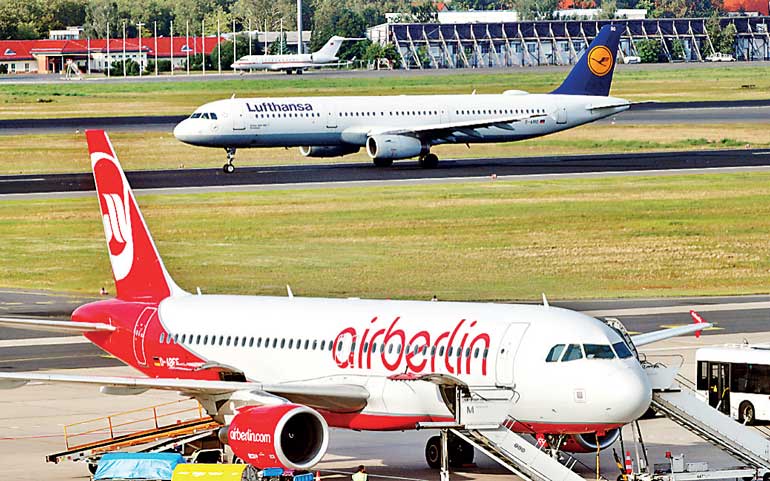Wednesday Feb 25, 2026
Wednesday Feb 25, 2026
Monday, 11 September 2017 00:00 - - {{hitsCtrl.values.hits}}
FRANKFURT (Reuters): The European Commission last week approved a German bridging loan for Air Berlin that will keep the insolvent airline’s planes flying while it tries to find buyers for its assets.

Air Berlin, Germany’s second-largest airline, filed for bankruptcy protection in August after shareholder Etihad Airways withdrew funding following years of losses.
The government pledged a 150 million euro ($179 million) loan to prevent Air Berlin’s planes from immediately being grounded, which would have stranded holidaymakers abroad and put around 8,000 jobs at risk only weeks before a national election.
“The measure will allow for the orderly wind-down of the insolvent airline Air Berlin without unduly distorting competition,” the Commission said in a statement.
The money will last at most until mid-November, which means the pressure is on to agree a carve-up of Air Berlin, whose assets include about 140 leased aircraft and valuable take-off and landing slots in Germany.
German flagship carrier Lufthansa has government backing to take over large parts of the airline. Britain’s easyJet and Thomas Cook’s Condor are also seen as likely bidders.
HSBC analysts said they expected Ryanair, which has said it is not bidding for Air Berlin assets, to also expand its capacity in Germany after Air Berlin is split up.
British Airways owner IAG may snap up any A320 or A330 aircraft left over at low lease prices following the carve-up, they added.
Safeguarding jobs
A few other investors have expressed interest in parts or all of Air Berlin, though they are seen less likely to prevail.
Businessman Alexander Skora on Monday proposed returning Air Berlin to its roots as a holiday carrier serving destinations such as Majorca.
Skora, who has so far invested mainly in real estate and startups, told Reuters he was looking at the carrier’s books and would then decide whether to submit a formal bid jointly with a consortium of unidentified investors from Israel, Canada and the United States.
German aviation investor Hans Rudolf Woehrl had expressed interest in Air Berlin as a whole but has stepped back from the process to search for a partner.
Utz Claassen, a former chief executive of German utility EnBW, is reportedly also interested but declined to confirm that in an interview with daily Handelsblatt on Monday, citing confidentiality.
Former motor racing driver Niki Lauda told Reuters on Sunday he was working on a bid to buy back Air Berlin’s Austrian unit Niki.
The premier of the German state of North Rhine-Westphalia, where Air Berlin flies from airports including Duesseldorf, said safeguarding jobs should play a major role in negotiations.
“Our goal is that we don’t talk just about aircraft and slots but also about the staff and the people,” Armin Laschet said on Monday, following a meeting with Air Berlin labour bosses and Berlin mayor Michael Mueller.
The deadline for offers is Sept. 15, and a decision could come on Sept. 21, three days before the national election.
BERLIN (Reuters): German taxes and regulation have allowed foreign airlines to take market share from German carriers and contributed to the failure of Air Berlin, Germany’s tourism trade body said.
Air Berlin, Germany’s second-largest airline, filed for bankruptcy protection this month after shareholder Etihad Airways withdrew funding following years of losses.
“Conditions distorting competition allow foreign competitors to carve out an increasingly large part of passenger volume,” Michael Frenzel, President of the federal association of Germany’s tourism sector, said.
The association, which represents travel-related industries including tour operators, hotels and airlines, called on the German government to ease the burden of costs such as Germany’s air travel tax, which was introduced in 2010.
At the same time, Frenzel said the association had no interest in a national champion, after Germany’s Economy Minister Brigitte Zypries said she would welcome it if Lufthansa took over substantial parts of Air Berlin.
“The days of big national carriers are over,” Frenzel said.
Tourism generates around 290 billion euros of annual revenues in Germany, accounting for around 3.9 percent of the economy and providing nearly 3 million jobs, according to the association.